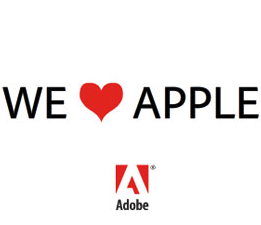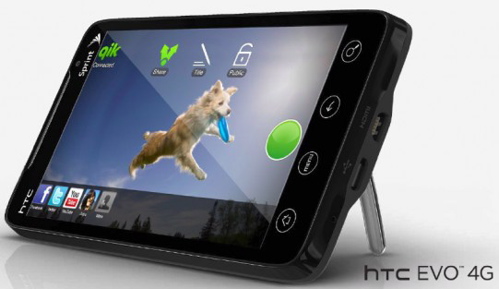
Iron Man 2, Prince of Persia give cinematic sendoffs for LG, HTC phones
In a pair of Android smartphone product previews this week, LG and Verizon Wireless promo'd an Iron Man 2 "augmented reality" app for the Ally, while HTC and Sprint drew on Sprint's long-time relationship with Disney to drum up interest. Yet sneak peeks of the two forthcoming smartphones also revealed the Ally's highly functional physical keyboard, and the EVO's impressive videoconferencing capabilities.
Verizon's LG Ally

Nintendo continues seek & destroy mission on DS game copiers, sues Web retailer
Video game company Nintendo today said it filed a civil lawsuit against New York-based website owner NXPGAME for selling game copiers that let users download and play ROMS of Nintendo DS and DSi games.
Nintendo says NXPGAME agreed to stop selling the game copier on its sites, but simply moved operations to a different URL.

EU warns Facebook its privacy changes are 'unacceptable'
An assembled group of telecommunications ministers from the European Union's member states, called the Article 29 Working Party, has warned Facebook that changes it recently made to its privacy policy to enable "Instant Personalization" -- also known as "Like" -- may be in violation of what they thought was an agreement made in November 2009.
That warning stops short of directly accusing Facebook of violating laws, though it leaves the door open for such a decision in the future.
According to a statement released yesterday from Brussels (the text of their letter has yet to be released), the ministers did imply that Facebook's public presence at a meeting entitled "Safer Networking Principles for the EU," where its representatives signed a pledge, appears to contradict the changes it made to privacy policy just days later.

Skype 5.0 beta brings five-way video chat
Video chatting is on the rise. Yesterday, we got to take a look at Qik's mobile video chat client for the Sprint EVO 4G, and today, we get to take a look at Skype's latest development: five-way video chat.
Today, popular VoIP and chat client Skype launched a beta of Skype 5.0 for Windows, which includes a free trial of group video calling, a re-designed call view window, improved video snapshots gallery, and improved browser plugin performance.

Adobe to Steve Jobs: 'We love you'
Yeah, but will Apple's CEO love Adobe back?
The Adobe-Apple breakup has taken on strange tabloid-like qualities over the last 30 days or so. Quick someone call in the paparazzi, but first ask if they'll be editing those photos in Adobe Photoshop, Photoshop Lightroom or Apple Aperture. Today, Adobe cofounders Chuck Geschke and John Warnock responded to Jobs' Aptil 29 "Thoughts on Flash" memo with their own: "Our thoughts on open markets." Adobe is supporting the memo with a marketing campaign -- "We love Apple" ads and "Freedom of Choice" Website." Adobe's response is measured and embracing, subtly placing the blame for the breakup on Apple. In the court of public and developer opinion -- perhaps shareholders in both companies -- Adobe may prove the venerable of the two parties here.

Adobe attempts to counteract anti-Flash sentiment spurred by Apple
Adobe is running quite a cleanup campaign after Apple CEO Steve Jobs' recent criticism of the Flash platform, which he laid out in a letter called "Thoughts on Flash."
Adobe has released a flurry of responses, including a letter from Chuck Geschke and John Warnock Adobe's Cofounders and Chairmen of the company's board of directors called "Our thoughts on open markets," an advertising campaign called "Freedom of Choice" which includes the banner shown above (and display ads that say "We [love] Apple,") an information page titled "The Truth about Flash," and a full-page ad in today's Washington Post.

Avoiding the next crash: The threat from outsourcing teaching aides
Modern "American dream" stories often start with a romantic phase: A young couple struggles through graduate school, starving on measly stipends covering ramen noodles and cheap wine. Unfortunately, that story is about to disappear, following American manufacturing jobs. College professors are now outsourcing grading, The Chronicle of Higher Education reported in April.
Teaching assistants (TAs) have provided that service for generations, but now it is going overseas. Recession-hit universities get even better deals outsourcing than they did with notoriously underpaid graduate students. Now, this work often ends up in the hands of credentialed Indian stay-at-home moms eager to work part-time.

Qik shows impressive low latency two-way video chat on HTC EVO 4G
Streaming video service Qik first debuted just over two years ago, letting users turn their smartphones into live webcams with just a simple app and a strong connection. Users can stream video from their phones live to Qik's site, but with considerable buffering.
However, with the growth of faster 4G connections, Qik has been able to put together a new two-way video chat app that lets users communicate in streaming video with very little latency.

LimeWire loses everything in infringement battle with RIAA
In a decision handed down in US District Court in New York this afternoon, representatives of the recording industry won summary judgment against P2P file-sharing software maker LimeWire, in a patent infringement suit first filed in 2006.
Though the case took almost four years to resolve, as Judge Kimba Wood wrote in her decision today, LimeWire may very well have sealed its fate in July 2008. At that time, Greg Bildson, the company's CTO/COO met with plaintiffs' attorneys to discuss a potential case settlement.

AMD to combat 'Intel Inside' with 'Who cares?'
Ever since it stopped billing itself as a producer of "replacements" for Intel CPUs, AMD has struggled with the platform question: the need for OEMs to produce PCs based on pre-determined patterns. Manufacturers can achieve price breaks when they buy parts in bulk, and platforms can help them do that; likewise, they can reap even more benefits down the road from selling popular platforms to the public.
It was Intel that figured out the platform formula first, ironically through the help of a brand it no longer uses: Centrino. Up until last year, although individual AMD processors have been successful in the consumer marketplace, and Opteron as a brand has reclaimed its respect among server makers, it's never been able to crack the nut for consumer-grade platforms. Last September, AMD announced it would try yet another spin on the platform approach, unveiling a new "Vision" brand for classes of PCs based on AMD processors. OEMs such as HP, Acer, and Dell would use these classes not to denote the processor in their PCs, but rather what those PCs are capable of doing.

Emergency LTE broadband networks approved for construction in 21 markets
Part of the national broadband plan includes the construction of a nationwide 700MHz broadband network specifically for emergency first responders. Until now, there are no broadband connection services specifically for public safety, and they have been limited to commercial services.
Today, the Federal Communications Commission (FCC) granted conditional approval of 21 petitions filed by cities, counties and states looking for waivers to move forward with the construction of regional interoperable wireless broadband networks. The Commission requires these broadband networks to be deployed under a common interoperability framework in coordination with the FCC's Emergency Response Interoperability Center (ERIC). Under this framework, all networks will be technologically compatible and interoperable.

HTC sues Apple to block sales of the iPhone, iPad, and iPod Touch in U.S.
In March, Apple sued smartphone maker HTC for 20 counts of patent infringement, alleging the company had "stolen [its] patented inventions" for the iPhone.
Today, HTC fired back at Apple in the same fashion, filing a complaint with the United States International Trade Commission (ITC) to stop the sale of the iPhone, iPad and iPod in the United States. The complaint accuses Apple of five counts of infringement.

Windows Mobile 6.5 may suck, but Microsoft is hoping free Office Mobile will stop users from switching phones before Windows Phone 7 is ready
There is a lot of anticipation for Windows Phone 7, but little reason for new phone buyers to pick up a Windows Phone right now. Even with the extremely attractive and powerful HTC HD2, users won't be able to upgrade their devices to Windows Phone 7 when the new OS hits the market at the end of this year. It's quite a dead end.
Therefore, Microsoft has been working on sweetening up the Windows Mobile 6 environment by dishing out free software. Yesterday, the Redmond company announced that Windows Mobile 6.x users would be getting turn-by-turn navigation for free, today, the software giant announced that Office Mobile 2010 is now a free upgrade for all Windows Mobile 6.5 users with the previous version of Office Mobile.

Who's more neutral? Republican bill would forestall FCC's 'Third Way'
It was inactivity from Congress on the matter of broadband Internet regulation that forced US Federal Communications Commission Chairman Julius Genachowski into an almost impossible situation. Taking what appeared to him to be the only legal and rational approach available, he boldly suggested last week that the Commission set up a system for splitting hairs over which parts of broadband fall under Title II of the Telecommunications Act, and which ones fall under Title I.
Perhaps unsurprisingly, it's the FCC's effort to accomplish what Congress couldn't, that has spurred at least some parts of Congress into action. Yesterday, one of the House's leading net neutrality skeptics, Rep. Cliff Stearns (R - Fla.), made good on a pledge his office revealed to Betanews last October, drafting new legislation that would prevent the FCC from building a "Third Way" for itself, unless it could prove to Congress that there was an emergency, and it could provide a cost/benefit analysis supporting its theory.

Privacy complaint rejected for lady ranking #3 in Google for 'epic boobs'
If you're a female human being, and your bust size has become such the object of public attention that suggestive but non-offensive photos of you turn up in a Google Images search for...well, that part of the body; and with photos in hand, a men's magazine begins a nationwide search for your identity and address, then has your privacy been violated?
In an extraordinary decision discovered earlier today by The Guardian's Roy Greenslade, the UK's Press Complaints Commission rejected the complaint of a woman whose photographs -- which she states were taken when she was an adolescent -- ended up among Google's most common image search results for the phrase "Epic Boobs." This despite the following facts: she says she was 15 when the photos were taken years earlier; the photos were uploaded to a supposedly private page operated by AOL's Bebo service back in 2006; she gave no one permission to use her image outside of Bebo; and she'd never had any contact with Loaded magazine prior to its search for "the Epic Boobs girl."